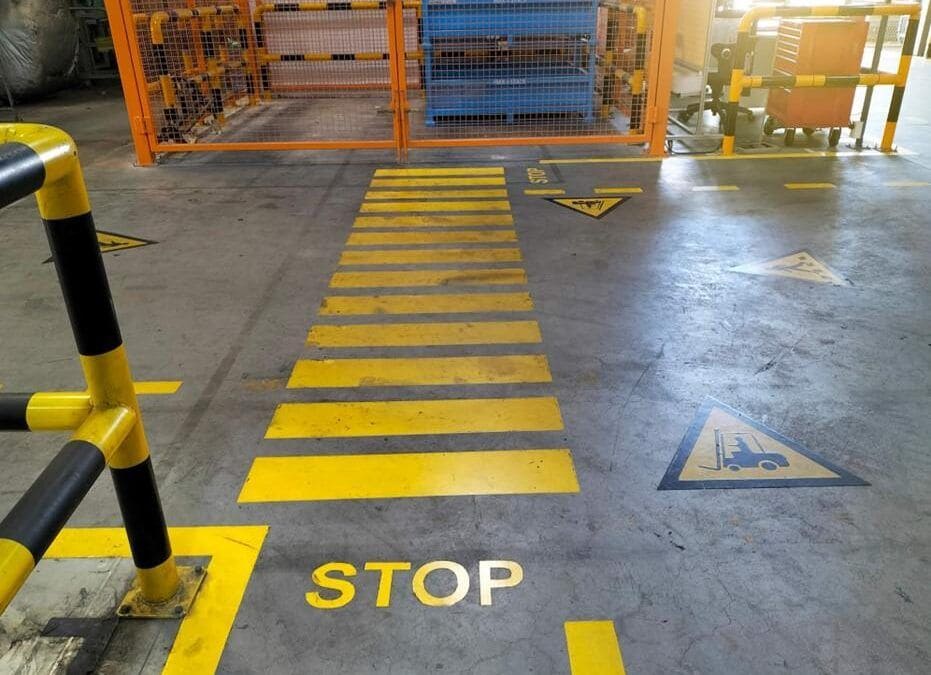
Flooring Solutions for Aerospace and Aviation Facilities
May 5, 2025
How to Prepare Your Facility for a Flooring Installation
May 30, 2025Industrial environments exposed to corrosive substances demand strategic, long-term protective solutions. Without them, the constant presence of harsh chemicals could compromise surface integrity, leading to equipment failure, production delays, and safety violations. This is where high-quality industrial painting services come into play.
Applying chemical-resistant coatings specifically designed for harsh environments ensures your facility’s infrastructure remains reliable, safe, and cost-effective. Learn about the importance of protective industrial painting to help you maintain compliance and operational continuity.
Why Use Chemical-Resistant Coatings in Harsh Environments?
Are your industrial operations routinely exposed to aggressive chemicals, extreme temperatures, or high humidity? These conditions accelerate surface degradation, leading to rapid metal corrosion, breakdown of concrete substrates, and compromised structural materials. Left unprotected, critical infrastructure becomes vulnerable to failure, contamination, and costly downtime.
Chemical-resistant coatings provide a crucial defense layer, preventing substances from reacting with the underlying materials. Choosing the right coating for your chemical processing plant, food and beverage production facility, or pharmaceutical lab can make the difference between years of maintenance-free performance and frequent, expensive touch-ups.
Key Steps of Protective Industrial Painting
The effectiveness of any industrial painting project hinges on several factors. A systematic, professional approach ensures coatings perform as expected. Every phase must be handled with expertise and precision, from the initial preparation to the final inspection:
- Surface prep: This is the foundation of every successful protective coating. Surfaces must be meticulously cleaned to remove oils, rust, and old coatings. Methods such as abrasive blasting and chemical cleaning eliminate contaminants and profile the substrate properly for optimal adhesion.
- Coating selection: Different environments call for different solutions. Choosing the right coating depends on the specific chemical exposure, temperature variations, moisture levels, and anticipated mechanical wear. The best industrial painting contractors will assess these variables to determine the most effective chemical-resistant coatings.
- Application techniques: Professionals use advanced methods to ensure uniform coverage and precise film thickness. Such consistent application is the key to preventing vulnerabilities like uneven curing, pinholes, and thin spots.
- Curing and inspection: Once applied, coatings must cure under controlled conditions. Inadequate curing may compromise chemical resistance, adhesion, and durability. Final inspections include visual assessments and testing for adhesion or thickness. This ensures the system is fully protective before the facility returns to operation.
Choosing the Right Chemical-Resistant Paint Solutions
Not all protective coatings can handle the same stresses. Some are engineered to withstand specific chemical compositions and concentrations, such as acids, alkalis, solvents, or caustic cleaners often encountered in industrial workflows. Selecting the right system requires knowledge of material science and the operational realities of each facility. Here are some of your options:
- Epoxy coatings: These are praised for their durability and resistance to water, solvents, and a wide range of chemicals. Epoxies form a hard, protective shell that performs well in static environments like tanks, secondary containment areas, and production floors.
- Polyurethane coatings: Known for their elasticity and abrasion resistance, polyurethanes are ideal for surfaces subject to mechanical movement or impact. They’re frequently used in production zones where equipment traffic, vibration, or shifting loads are part of daily operations.
- Fluoropolymer coatings: These coatings are engineered for maximum chemical resistance, especially against acids, oxidizers, and aggressive solvents. They are often used in specialized environments where standard systems would degrade rapidly.
Effective Application Methods in Harsh Industrial Conditions
Even the most advanced coatings are prone to failure if applied using the wrong method. Harsh environments require specific application techniques to ensure proper bonding, coverage, and chemical resistance. Skilled industrial painting providers combine product expertise with trained crews to deliver reliable, repeatable outcomes.
Some common application methods when painting in harsh environments include:
- Airless spraying: This delivers a high-pressure application without getting air in the mix for clean, even coverage and minimal overspray, making it especially useful on large surfaces like walls and ceilings.
- Plural component spraying: This method blends two reactive components at the spray nozzle, allowing for rapid curing. It’s ideal for fast-setting coatings used on heat-sensitive substrates.
- Brush and roller application: While not ideal for every job, these techniques are valuable for edge work, repairs, or coating small, complex surfaces. Experienced applicators know how to seamlessly integrate these sections with sprayed areas.
Maintenance and Longevity Strategies
Like any industrial asset, chemical-resistant coatings require ongoing attention to reduce long-term costs, enhance safety, and support compliance with health and environmental standards. A proactive maintenance strategy includes:
- Routine inspections: Scheduled assessments allow you to identify early signs of wear, such as cracking, delamination, or color changes. Early detection gives you time to perform minor touch-ups instead of paying for a complete reapplication.
- Scheduled recoating: Coatings have a finite service life. Following a set recoating timeline helps prevent exposure risks. Keep in mind that recoating may be required more often for operations with high chemical exposure or frequent cleaning needs.
- Environmental monitoring: Changes in chemical use, cleaning regimens, or operational temperature may affect coating performance. Monitoring these variables can inform necessary adjustments in maintenance practices.
Why Industrial Leaders Choose MSC Floors
Facility maintenance managers across Michigan, Ohio, and Northern Indiana trust MSC Floors for dependable industrial painting services built around safety, efficiency, and long-term protection. We specialize in chemical-resistant paint solutions engineered for harsh environments. We also invest heavily in our employees, providing the training and resources to maintain our standards and deliver consistent results. The MSC Experience is all about delivering a professional, organized process that respects your facility and schedule. Connect with us today to explore how our protective industrial painting services can advance your operation’s safety, efficiency, and long-term performance.




